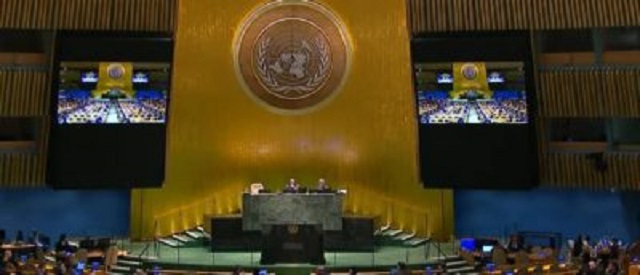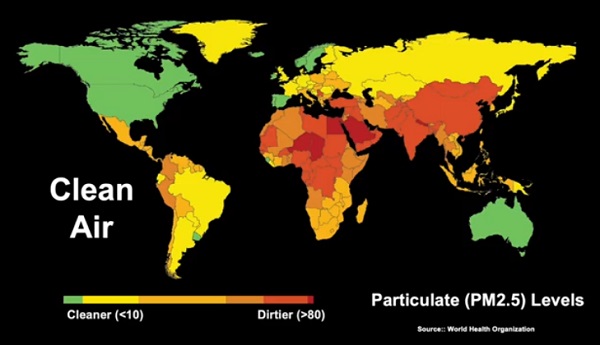Environment
The United Nations Couldn’t Be More Wrong When It Comes To Climate Change

 From the Daily Caller News Foundation
From the Daily Caller News Foundation
By JASON ISAAC
They still haven’t learned their lesson.
For decades, politicians and climate activists have been setting deadlines for humanity, brazenly preaching that we have just a few years left to stave off our fiery doom. In fact, we were supposed to have passed the deadline for taking dramatic action to save the world in 2000, 2012, 2016 2020, and 2023.
The United Nations is now ramping up their rhetoric again, with climate executive secretary Simon Stiell boldly (and, apparently, not rhetorically) asking: “Who exactly has two years to save the world? The answer is every person on this planet.”
As usual, the U.N. couldn’t be more wrong when it comes to climate change. In fact, the science to which it demands blind loyalty shows there has never been a better time in human history to be alive.
One Obama energy advisor described our culture’s understanding of climate change as having “drifted so far out of touch with the actual science as to be absurdly, demonstrably false.” He was not wrong. While celebrities, activists, politicians, and left-leaning CEOs are crying that the sky is falling, data shows that “[c]limate-related disasters kill 99% fewer people” than they did a century ago. Even though the world’s population has quadrupled over the same time period, the risk presented by mild warming has grown smaller and smaller.
Interestingly, our resilience to climate-related disasters is improving at a far faster rate than deaths from other natural disasters like volcanic eruptions and earthquakes. Clearly, the weather isn’t the culprit here.
In fact, even if the U.N. and its climate cartel were right, there is remarkably little we could do anyway. The data models their scientists use to project future warming show that even cutting every drop of oil and every grain of coal from our society would change global temperatures by at most a few hundredths of a degree. Those models, by the way, have overshot warming every time, making them a highly suspect justification for spending trillions to force our society to make dramatic changes for climate change.
In fact, new studies cataloging 420,000 years of historical geological and weather data suggest that manmade greenhouse gas emissions are not strong enough to affect global temperatures.
So many of us, in our comfortably air-conditioned and Wi-Fi-enabled lives — far removed from the blue-collar energy producers toiling every day to power our society — have forgotten just how essential fossil fuels are to our existence. Our agriculture, manufacturing, healthcare, transportation, public safety, utilities, banking, construction, entertainment and more would collapse without constant access to affordable, reliable energy.
Fossil fuels are the reason that the percentage of people living in extreme poverty has plummeted all over the world. In the pre-Industrial Revolution era, most of the world’s population lived in extreme poverty; 50 years ago it was about half the world population; today, it is less than 10%. Infant mortality, malnutrition and infectious diseases have plummeted while GDP, education, gender equality, economic freedom and life expectancy have skyrocketed.
The average child born today in any part of the world has a better chance at a long, healthy, and fruitful life than ever before — thanks, in part, to the life-saving and life-improving benefits of abundant energy.
We need only look to the pockets of the world still suffering from energy poverty to understand just how fortunate we are to live in 2024 instead of 1724. In communities without electricity — which nearly a billion people still don’t have and billions more have only sporadic access to — life expectancies still hover in the 50s and mere survival requires physical toil unimaginable to the average American.
Women walk for hours to collect unsanitary water and firewood or dung to burn in close quarters, exposing themselves to sexual assault and their whole families to deadly water-borne and lung disease. Children are fortunate to reach adulthood at all, let alone receive an education. Economic opportunity is close to nonexistent, even for men, outside subsistence farming.
Instead of protesting the fossil fuels that power our comfortable lives and spending trillions to possibly produce minute temperature change centuries from now, perhaps our world leaders should focus on solving the real problems facing real men, women, and children today. One of the easiest ways to do so is sharing the access to affordable, reliable energy we take for granted in the West.
I’ll keep embracing my high carbon lifestyle and hope that others get to do the same. See you in two years.
The Honorable Jason Isaac is CEO of the American Energy Institute and a senior fellow at the Texas Public Policy Foundation. He previously served four terms in the Texas House of Representatives.
The views and opinions expressed in this commentary are those of the author and do not reflect the official position of the Daily Caller News Foundation.
Energy
Affordable Energy: Everything you need to know about energy and the environment

The Dual Challenge: Energy and Environment
Scott Tinker
The world faces two important and interrelated challenges. Affordable and reliable energy for all, and protecting the environment. The energy-environment challenge is not simple, but it is solvable if we understand and address the complex fabric of energy security, scale of energy demand, physics of energy density, distribution of energy resources, interconnectedness of the land, air, water and atmosphere, and the extreme disparity in global wealth and economic health. The truth is that there are no good and bad, clean and dirty, renewable and nonrenewable energy sources. They all have benefits, and they all have challenges. Climate change is an important issue, but it is not the only environmental issue. Solar and wind are important low carbon solutions, but they are only part of the solution. We must put our best minds to the task of addressing the dual challenge, working together to better the world.
Economy
Canadian Natural Gas Exports Could Significantly Reduce Global Emissions

From the Fraser Institute
By Elmira Aliakbari and Julio Mejía
Doubling Canadian natural gas production and exporting to Asia could reduce global emissions by up to 630 million tonnes—nearly as much as Canada produces in a year
Canada could help significantly reduce global greenhouse gas emissions by increasing natural gas production and exporting the additional supply to Asia in the form of liquefied natural gas (LNG), according to a new study from the Fraser Institute, an independent, non-partisan Canadian public policy think tank.
“As countries like China and India continue to burn coal for power, Canadian LNG offers a lower-emission alternative with the potential for major global impact,” said Elmira Aliakbari, director of natural resource studies at the Fraser Institute and coauthor of the study, Exporting Canadian LNG to the World: A Practical Solution for Reducing GHG Emissions
The study estimates the impact from Canada doubling its natural gas production and exporting to Asia to replace coal-fired power. In that scenario, global emissions could drop up to 630 million tonnes annually, which is the equivalent of removing approximately 137 million cars from the road. More specifically, replacing coal-fired power in China with Canadian LNG could cut emissions by up to 62 per cent for every unit of power produced.
“Focusing only on domestic emissions ignores Canada’s potential to support global climate goals,” said Aliakbari. “By displacing coal abroad, Canadian LNG can play a critical role in cutting total global emissions even if domestic emissions were to increase.”
However, regulatory uncertainty and a range of federal and provincial policies continue to hinder LNG development in Canada, despite strong global demand.
“Policymakers need to clear a path if Canada is going to play a meaningful role in reducing global emissions,” Aliakbari added.

Exporting Canadian LNG to the World: A Practical Solution for Reducing GHG Emissions
- Coal, a major source of greenhouse gas (GHG) emissions, remains a leading energy source in many Asian countries, especially China and India. Some European countries have also turned back to coal as sanctions on Russian energy intensified following the invasion of Ukraine.
- As the world seeks practical solutions for reducing greenhouse-gas emissions, natural gas, with its lower carbon footprint, offers a promising alternative to coal.
- With abundant reserve, Canada is well positioned to help reduce global reliance on coal. By exporting Canadian liquified natural gas (LNG) and helping Asian and European countries reduce their reliance on coal, Canada can lower net global GHG emissions.
- Exporting LNG from Canada to China and substituting LNG for coal in the generation of power there can eliminate between 291 and 687 gCO₂eq per kWh of power generated, a reduction of between 34% and 62%.
- If Canada were to double its current natural gas production and export the additional supply to Asia as LNG to displace an equivalent amount of coal used to generate power, global GHG emissions could be reduced by up to 630 million tonnes annually, a significant reduction equivalent to 89% of Canada’s total GHG emissions.
- Canada enjoys several competitive advantages, including cooler temperatures that reduce liquefaction energy costs and a strategic location that offers shorter shipping routes to Europe and Asia compared to many other suppliers.
- Regulatory challenges and a mix of federal and provincial policies, however, have slowed or blocked LNG developments in Canada.
-

 conflict2 days ago
conflict2 days agoIran nuclear talks were ‘coordinated deception’ between US and Israel: report
-

 Alberta2 days ago
Alberta2 days agoPunishing Alberta Oil Production: The Divisive Effect of Policies For Carney’s “Decarbonized Oil”
-

 International2 days ago
International2 days agoIsrael’s Decapitation Strike on Iran Reverberates Across Global Flashpoints
-

 Energy2 days ago
Energy2 days agoCanada is no energy superpower
-

 Health2 days ago
Health2 days agoJust 3 Days Left to Win the Dream Home of a Lifetime!
-

 Alberta2 days ago
Alberta2 days agoAlberta Premier Danielle Smith Discusses Moving Energy Forward at the Global Energy Show in Calgary
-

 Fraser Institute2 days ago
Fraser Institute2 days agoLong waits for health care hit Canadians in their pocketbooks
-

 conflict1 day ago
conflict1 day agoOne dead, over 60 injured after Iranian missiles pierce Iron Dome





